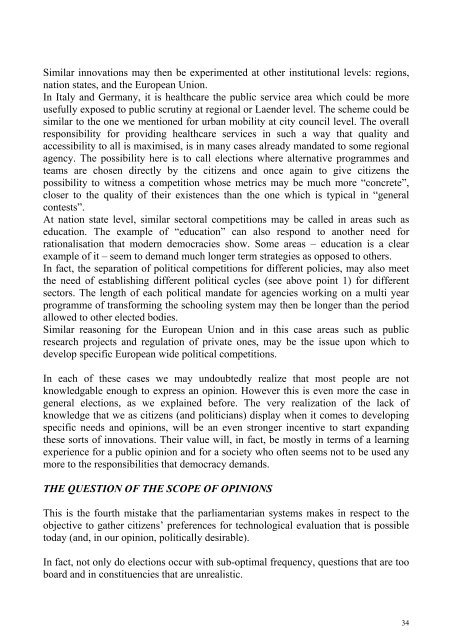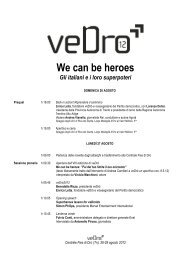democracy - Vision the Italian Think Tank
democracy - Vision the Italian Think Tank
democracy - Vision the Italian Think Tank
You also want an ePaper? Increase the reach of your titles
YUMPU automatically turns print PDFs into web optimized ePapers that Google loves.
Similar innovations may <strong>the</strong>n be experimented at o<strong>the</strong>r institutional levels: regions,nation states, and <strong>the</strong> European Union.In Italy and Germany, it is healthcare <strong>the</strong> public service area which could be moreusefully exposed to public scrutiny at regional or Laender level. The scheme could besimilar to <strong>the</strong> one we mentioned for urban mobility at city council level. The overallresponsibility for providing healthcare services in such a way that quality andaccessibility to all is maximised, is in many cases already mandated to some regionalagency. The possibility here is to call elections where alternative programmes andteams are chosen directly by <strong>the</strong> citizens and once again to give citizens <strong>the</strong>possibility to witness a competition whose metrics may be much more “concrete”,closer to <strong>the</strong> quality of <strong>the</strong>ir existences than <strong>the</strong> one which is typical in “generalcontests”.At nation state level, similar sectoral competitions may be called in areas such aseducation. The example of “education” can also respond to ano<strong>the</strong>r need forrationalisation that modern democracies show. Some areas – education is a clearexample of it – seem to demand much longer term strategies as opposed to o<strong>the</strong>rs.In fact, <strong>the</strong> separation of political competitions for different policies, may also meet<strong>the</strong> need of establishing different political cycles (see above point 1) for differentsectors. The length of each political mandate for agencies working on a multi yearprogramme of transforming <strong>the</strong> schooling system may <strong>the</strong>n be longer than <strong>the</strong> periodallowed to o<strong>the</strong>r elected bodies.Similar reasoning for <strong>the</strong> European Union and in this case areas such as publicresearch projects and regulation of private ones, may be <strong>the</strong> issue upon which todevelop specific European wide political competitions.In each of <strong>the</strong>se cases we may undoubtedly realize that most people are notknowledgable enough to express an opinion. However this is even more <strong>the</strong> case ingeneral elections, as we explained before. The very realization of <strong>the</strong> lack ofknowledge that we as citizens (and politicians) display when it comes to developingspecific needs and opinions, will be an even stronger incentive to start expanding<strong>the</strong>se sorts of innovations. Their value will, in fact, be mostly in terms of a learningexperience for a public opinion and for a society who often seems not to be used anymore to <strong>the</strong> responsibilities that <strong>democracy</strong> demands.THE QUESTION OF THE SCOPE OF OPINIONSThis is <strong>the</strong> fourth mistake that <strong>the</strong> parliamentarian systems makes in respect to <strong>the</strong>objective to ga<strong>the</strong>r citizens’ preferences for technological evaluation that is possibletoday (and, in our opinion, politically desirable).In fact, not only do elections occur with sub-optimal frequency, questions that are tooboard and in constituencies that are unrealistic.34





